Sunday, February 27, 2005
Fine As Wine...
I went down to the river,
I set down on the bank.
I tried to think but couldn't,
So I jumped in and sank.
I came up once and hollered!
I came up twice and cried,
If that water hadn't a-been so cold I might've sunk and died.
But it was Cold in that water! It was cold!
I took the elevator Sixteen floors above the ground.
I thought about my baby And thought I would jump down.
I stood there and I hollered!
I stood there and I cried!
If it hadn't a-been so high I might've jumped and died.
But it was High up there! It was high!
So since I'm still here livin', I guess I will live on.
I could've died for love-- But for livin' I was born
Though you may hear me holler, And you may see me cry-- I'll be dogged, sweet baby, If you gonna see me die.
Life is fine! Fine as wine! Life is fine!
Langston Hughes
Friday, February 25, 2005
Snow Poetry and Pictures by Mrs. Kearney's Class
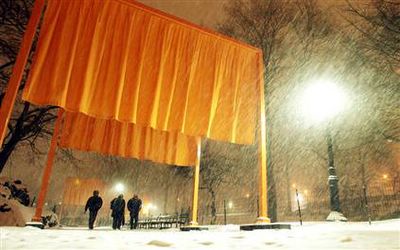
Mario Tama, Getty Images
Snow
Snow is as white as glue,
Snow is as slushy as a slurpy,
Snow is as shiny as a nickel,
Snow is as crunchy as popcorn,
Snow is as wet as water,
Snow is as fluffy as a rabbit,
Snow is as smooth as an apple,
Snow is as sparkly as jewels,
Snow is as clear as glass,
Snow is as icy as ice pops,
I love snow!
alyssa
Thursday, February 24, 2005
Martello: Part One
Martello popped a couple of the bits in his mouth and checked out the papers. Lots of Posts. Martello thought the Post was an unreadable right-wing rag unsuitable even for wrapping fish, however he knew he was decidedly in the minority around the station on that one. Most of the guys were so far right Martello had to just sit quietly with a shit-eating grin to get through lunch without a fight.
Something about cops he never understood. Sure, they saw the dregs of the streets everyday, and took a lot of abuse too, but Martello thought the very fact that cops saw what miserable lives most people lived would make them more sympathetic. Martello often thought, cruising down the dusty end of Jarvis, or the long, wasted stretches of Eglington in Scarborough that the only thing between him and the fucked up misery that he saw was a thin, metal door with “To Serve and Protect” stencilled on it. “To Deal with Shit So You Don’t Have To!” was more like it. Or “I See You, Fucker, I See You!” The guys would love that.
Wednesday, February 23, 2005
Life...You Can't Take It With You...
The best world stood for the chance to be lonely within a camaraderie of loneliness
Joyce Johnson
Frank was so sure that a world must be good that had him in it.
Jeff Cantor
What the hell kind of life was this? What in God's name was the point or the meaning or the purpose of a life like this?
Richard Yates
Tuesday, February 22, 2005
Why It's Best Not To Listen to Your Critics...

George Gershwin
Of the reviews that were out for blood, the composer was reportedly most wounded by Virgil Thomson's assertion that "Gershwin was not and never did have the power of sustained musical development." Thomson's review is a dizzying mixture of perspicacity and poison. Asserting that Gershwin was a charming but not, of course, a "serious" composer, had adhered for too uncritically to his "melting pot" sources," Thomson conceded that "Porgy and Bess" was fully alive despite being afflicted by "fake folklore" and - as the phrase appeared in the journal Modern Music - "plum pudding orchestration" (In Thomson's collection, the phrase is "gefiltefish orchestration" One suspects that the editor of Modern Music found this choice of delicacy distasteful.)
"Porgy and Bess" closed in just over three months, losing its entire investment. The sudden demise of his most beloved work prompted Gershwin to leave for Hollywood in the summer of 1936 - he had a big success there five years earlier - although Hollywood was not particularly eager to have him. The boy genius had fallen down hard.
"I had to live for this," Gershwin grumbled, "that Sam Goldwyn should say to me, 'Why don't you write hits like Irving Berlin?'"
Claudia Roth Pierpont, New Yorker
Monday, February 21, 2005
"It's time we began to laugh and cry about it all again!"

Original Pogues Lineup
Last Christmas, a celebrating O'Riordan had just been thrown out of Dublin's Shelbourne pub when she came across a familiar figure. "I went, 'Shaaane!' " she laughs. "I used to be in your band." Touchingly, MacGowan said that he has missed the Pogues and wanted to build on a previous week-long reunion in 2001 (which was without O'Riordan, who he clearly adores). He won't say whether he misses the way songs once came to him "bang, bang, bang . . . like from above, as if I was just the conduit."
Which brings us back to this apparent creative block. As I tiptoe towards the "dark period", he refutes any suggestion that he's somehow paying the price of abuse, particularly of LSD, which for a time was a major creative tool. "I took my first trip at 14," he snorts. "I've never stopped taking acid." So why did the songs stop? Finally he snaps. "Because my fucking girlfriend left me." Can you not put that in song? "I could, but I'm hoping she'll come back to me." MacGowan looks like he could punch me. I almost want to hug him.
MacGowan recently moved back to the farmhouse in "Tipp" where he grew up, and it's been good for him. The black mood vanishes as quickly as it arrived. He jokes - looking me right in the eye - of "walking in the fields, shooting trespassers". More candidly, he admits that he has been unhappy but has been helped by eastern mysticism, and shows me a book which falls open at the line: "By wiping away ego we can see things as they are." In May, a new MacGowan composition, Road to Paradise, emerged on a charity EP in aid of ex-Celtic and Scotland footballer Jimmy Johnstone, who has motor neurone disease. The situation is further muddied by Woods' assertion that Shane is happier because he's not under pressure. "But he does have new material and I know some of it is really good. He's beginning to come back to what he was."
I ask MacGowan to sign a record sleeve and at first he seems uncomfortable, saying: "Can't we do it at the gig?" Then he remembers that he's in a hotel, "the gig" isn't until December and embroiders If I Should Fall From Grace With God with scrawl. I'm expecting something offensive, but it reads beautifully, like a lyric: "It's time we began to laugh and cry about it all again!"
Dave Simpson, The Guardian
Sunday, February 20, 2005
Mike Myers on Toronto: Parts Five through Ten...
Thought 5: I'm so proud that Toronto is very clean.
Thought 6: I'm so grateful to my Mom and Dad that they chose to move to Toronto from Liverpool, England in 1956. That was two years after Toronto got a subway. That leads me to Thought 7.
Thought 7: I love the TTC. It's clean, it's safe, it's cheap, it's on time. I even love the logo, the typeface, the colours, the fact that street musicians have to audition, the "Ninety! Ninety-Niner! Ninety-Niner!" PA announcements that, to this day, I have no idea what they mean. I have many fond memories of the Queen Street Streetcar, and all of the characters that I rode into town with when I lived in Parkdale. I think the TTC Uniform is cool, and I would like to own one. I love that the subway takes you right to ACC. It's the best way to get to the game. That leads me to Thought 8.
Thought 8: I love the Toronto Maple Leafs. I love the history. (See Thought 3 again.) I love the uniform. I love the game of hockey. I love its contradictions. I love the fact that Toronto fans will applaud a good play even by a visiting team. That leads me to Thought 9.
Thought 9: I love the people of Toronto. The kindness, politeness, and decency of the average citizen are remarkable. I'm often puzzled by some Torontonians who seek to make Toronto "A World-Class City." It already is. In my job, I've had the good fortune to be able to travel around the world, and in my sojourns I've met many nice people, individually. However, I've never experienced "nice" collectively like I have walking the streets of Toronto. I think "nice" is underrated. That leads me to Thought 10.
Thought 10: I love ketchup potato chips. They're underrated. (Sometimes you can get "ketchup potato chip hands," which are a lot like "cheesy hands," but with ketchup potato chips you end up looking like Lady Macbeth.)
Friday, February 18, 2005
Mike Myers on Toronto: Parts One through Four...

The Toronto Sun asked me to write a few words about my feelings on getting a Star on the Canadian Walk of Fame. Now, I'm not one for speechifying, but I do have some thoughts.
Thought 1: I'm intensely proud and honoured to be included in the company of Shania Twain, Linda Evangelista, Robbie Robertson, Scotty Bowman, Toller Cranston, Jim Elder, Lynn Johnston, Luc Plamondon, David Steinberg, and especially Lorne Michaels as inductees on the Canadian Walk of Fame. It's very cool to be included on the same list. This leads me to Thought 2.
Thought 2: Canadians are a nation of list-makers. Part of the Canadian experience (apart from sticking your tongue on a frozen metal pole in January) is keeping track of Canadian accomplishments. The world's longest street - Yonge Street. The world's tallest free-standing structure - The CN Tower. The invention of Standard Time. The birthplace of Mary Pickford. (I was born at Woman's College Hospital, several hundred yards away from Mary Pickford's birthsite.) The invention of insulin. Winnie the Pooh. Independence without revolution. The longest covered bridge in the world. The Avro Arrow. The snowmobile. The telephone. Basketball. The Macintosh Apple. Pablum. Frozen Food. Ginger Ale. The first documentary film. Superman. IMAX. The zipper. The paint-roller. The green garbage bag. Trivial Pursuit. And last but not least, hockey. This leads me to Thought 3.
Thought 3: Americans are sick and tired of me talking about Canada incessantly. Frequently, I will hear my American brethren say, "Oh no, here comes the List." This leads me to Thought 4.
Thought 4: Because of Thought 3, I've had to "Trojan Horse" my Canadian references in the popular culture. I call these: "Letters to Home." Coded messages for my Canadian friends. In "Wayne's World," "Stan Mikita's Doughnuts" doubled for "Tim Horton's Doughnuts," and "Officer Koharski" was named after the NHL referee Don Koharski. (A lovely man - he gave me a ref shirt once - it was cool.) "Aurora, Illinois" is in honour of Aurora, Ontario. In "Goldmember," Dr. Evil is caught and the news of it is presented on a mythical, CNN-type news broadcast. At the bottom of the screen, the teletype reads: "Toronto Wins Stanley Cup.
Toronto Voted Best City in the World." In the first "Austin Powers" - during the Dr. Evil "Family Therapy Scene" - one of the sons in the group is named "Dave Keon." Carrie Fisher, who played the therapist in that scene, asked me if she could say a different name that was easier for her to pronounce, and I said, "No," and then went on to explain the importance of the Toronto Maple Leafs for twenty minutes. To which, she said, "Fine, 'Dave Keon' it is if it'll get you to shut up about Toronto." (See Thought 3.) She then went on to say that she'd been to Toronto, loved it, and thought it was "Very clean."
Negroponte New National Security Director: I'm Sleeping Sounder Already!
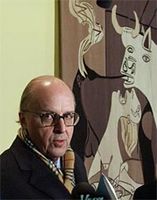
What is the background of John D. Negroponte and why is he being sent to Iraq?
John Negroponte served as US ambassador to Honduras from 1981 to 1985. As Ambassador in Tegucigalpa, he played a key role in supporting and supervising the Nicaraguan Contra mercenaries who were based in Honduras. The cross border Contra attacks into Nicaragua claimed some 50 000 civilian lives.
During the same period, Negroponte was instrumental in setting up the Honduran military death squads, "operating with Washington support's, [they] assassinated hundreds of opponents of the US-backed regime."
"Under the rule of General Gustavo Alvarez Martnez, Honduras's military government was both a close ally of the Reagan administration and was "disappearing" dozens of political opponents in classic death squad fashion.
In a 1982 letter to The Economist, Negroponte wrote that it was "simply untrue to state that death squads have made their appearance in Honduras." The Country Report on Human Rights Practices that his embassy sent to the Senate Foreign Relations Committee took the same line, insisting that there were "no political prisoners in Honduras" and that the "Honduran government neither condones nor knowingly permits killings of a political or nonpolitical nature."
Yet according to a four-part series in the Baltimore Sun in 1995, in 1982 alone the Honduran press ran 318 stories of murders and kidnappings by the Honduran military. The Sun described the activities of a secret CIA-trained Honduran army unit, Battalion 316, that used "shock and suffocation devices in interrogations. Prisoners often were kept naked and, when no longer useful, killed and buried in unmarked graves."
On August 27, 1997, CIA Inspector General Frederick P. Hitz released a 211-page classified report entitled "Selected Issues Relating to CIA Activities in Honduras in the 1980's." This report was partly declassified on Oct. 22, 1998, in response to demands by the Honduran human rights ombudsman. Opponents of Negroponte are demanding that all Senators read the full report before voting on his nomination.[to the position of US Permanent Representative to the UN}" (See Face-off: Bush's Foreign Policy Warriors by Peter Roff and James Chapin,
In a cruel irony, the Bush administration has appointed a bona fide "terrorist" to wage its "war on terrorism" in Iraq.
In the words of Human Rights Watch's executive director Kenneth Roth: "There are serious unanswered questions about his complicity with the atrocities in Honduras and the war in Nicaragua."
http://www.globalsearch.ca
John Negroponte was ambassador to Honduras from 1981-1985. As such he supported and carried out a US-sponsored policy of violations to human rights and international law. Among other things he supervised the creation of the El Aguacate air base, where the US trained Nicaraguan Contras during the 1980's. The base was used as a secret detention and torture center, in August 2001 excavations at the base discovered the first of the corpses of the 185 people, including two Americans, who are thought to have been killed and buried at this base.
http://www.derechos.org
Thursday, February 17, 2005
The Season is Over: Part Three: The Owner's "Good Old Days"

Dave Keon, Toronto Maple Leafs
NHL MINIMUM SALARY, 1963-64 - $7,000 CAN
PARENT, BERNARD, 1977-78 - $1,000,000 US
HULL, BOBBY, 1977-78 - $1,000,000 US
SANDERSON, DEREK, 1977-78 - $1,000,000 US
TREMBLAY, MARIO, 1974-75 - $80,000 CAN
SANDERSON, DEREK, 1969-70 - $13,000 US
ORR, BOBBY, 1967-68 - $35,000 US
SANDERSON, DEREK, 1967-68 - $10,000 US
ORR, BOBBY, 1966-67 - $35,000 US
WORSLEY, GUMP, 1965-66 - $28,000 CAN
MAHOVLICH, FRANK, 1962-63 - $25,000 CAN
RICHARD, MAURICE, 1959-60 - $25,000 CAN
HARVEY, DOUG, 1959-60 - $25,000 CAN
BELIVEAU, JEAN, 1957-58 - $21,000 CAN
BELIVEAU, JEAN, 1956-57 - $21,000 CAN
BELIVEAU, JEAN, 1955-56 - $21,000 CAN
BELIVEAU, JEAN, 1954-55 - $21,000 CAN
BELIVEAU, JEAN, 1953-54 - $21,000 CAN
FREDERICKSON, FRANK, 1925-26 - $3,500 CAN
MORENZ, HOWIE, 1923-24 - $3,500 CAN
LALONDE, NEWSY, 1921-22 - $2,000 CAN
LALONDE, NEWSY, 1917-18 - $1,300 CAN
The Season is Over: Part Two...
Why wouldn't the players bend to the lower figure? "Because it was the players who said from the start that they would not accept the salary cap," Lavoie said. "I consider that the players went a very long way to the position of the owners. It was the owners who wouldn't budge."
Based on salary figures for the 30 teams last season, seven clubs would have exceeded the league's proposed $42.5-million cap, totalling about $84-million. Using the players' $49-million proposal, six clubs, totalling roughly $42-million, would have exceeded the cap. The difference in the two proposals amounts to about $42-million.
While those figures could change, not everyone buys Bettman's insistence that the cap becomes a magnet for all teams to hit.
Carter is among those who doubt the league wanted to strike a deal, suggesting that its recent proposals and refusal to negotiate further had much to do with an anticipated legal battle.
"Had Bettman not done any bargaining, he would have been in a legal bind," Carter said. "At least this way he appears to bargain in good faith. You don't get into a business quagmire like this without the potential for massive legal complications, so in this case business and law do go together."
One course of action for the league is declaring an impasse in negotiations and attempting to open the 2005-06 season with replacement players. However, to do that, the league would likely have to defend itself before the U.S. National Labor Relations Board, saying that it bargained in good faith.
Toronto sports lawyer Gord Kirke also agrees that the league's decision was driven by more than just bottom-line economics.
"My thought," Kirke said, "is that if you had two sides that were truly motivated to make the deal, and make it within the time frame mandated by commissioner Bettman, then it should have been easy to accomplish. If there were other factors at work, you can see why they wouldn't bridge that gap.
"If there was the ultimate in good-faith bargaining and they wanted to get it done by 1 p.m. [Wednesday], it should have been a real easy thing to accomplish."
David Naylor, Globe and Mail
Wednesday, February 16, 2005
On Power, Part One...
The power of someone who can get you to do exactly what they want simply through a question - "Does that seem loud to you?" "What are you doing?", "Are you still smoking?"
The infinite power of those who ask instead of tell.
It'll go wherever we take it...

Johnny Griffin
I once asked a musician where jazz was going and he said, "It'll go wherever we take it, we're the musicians." And I don't know of a really better answer. One thing I do know about the future of jazz is that nobody has adequately or accurately predicted it. Nobody in the swing era predicted bebop, nobody in the bebop era predicted the avant garde, and certainly nobody in the avant garde predicted fusion.
Some young musician's gonna come along, hopefully it'll be someone really thrilling like Armstrong or Parker, but somebody of extraordinary gifts, and he or she will play a music that no one else has heard and that will be the next movement. And unless you're that musician, you can't really know what that's gonna be.
Gary Giddens
Tuesday, February 15, 2005
He Could Not Picture it Now...
"Are you in love?" he said.
"I thought I was. I thought I loved someone," she said, "But he wasn't worth loving, I guess."
"I'm so sorry," he said.
He remembered the last time they had met, the sound the tires made as the car raced across the wooden bridge. He remembered looking into the glare of the lights of approaching cars and thinking for a moment that he could see again the curve of her naked back. He could not picture it now.
"I'm so sorry," he said, thinking he too, may not have been worth loving.
"It's not important," she said.
What is? What is? What is? he thought.
He Dreamed of Her in Every Hotel Room...
Her name was from the Bible. It made her seem respectable. She thought it meant she could be found in every hotel room.
He loved her although he was not sure when he had first known this. It was a solid respectable love although he dreamed of her in every hotel room.
Monday, February 14, 2005
The Work of Art is Free for All to Enjoy...
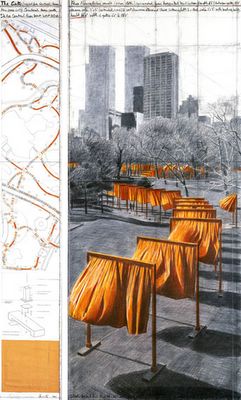
www.christojeanneclaude.net
• 5,290 US Tons of steel (4,799 Metric Tons) (10,580,000 pounds) (equal to 2/3 the steel in the Eiffel Tower) for 15,000 specially designed steel footing weights, varying between 615 and 837 pounds each, according to the width of the gate, (279 - 379 Kg.). Gates vary in width because there are 25 different widths of walkways in Central Park. The weights are resting on the hard surface of the walkways. There will be no holes in Central Park.
• 315,491 linear feet (60 miles) (96.5 Km.) of Vinyl tube, 5 inch x 5 inch square, (12,7 x 12,7 cm.) extruded in saffron color, recyclable, specially designed, (for each gate: 2 vertical 16 feet long (4,87 meter), and one horizontal (varying between 6 and 18 feet, because the width of the walkways varies)
• 15,000 specially designed, recyclable, cast aluminum upper corner reinforcements which hold together the 2 vertical poles to the horizontal pole.
• 15,000 base anchor sleeves. Which will be bolted to the steel footing weights.
• 15,000 (1/2 inch x 8 inch x 8 inch) (1.27 x 22,8 x 22,8 cm.) steel leveling plates. The leveling plate is between the base anchor sleeve and the steel base, it has a pivoting bolt which will ensure the perfect verticality of the poles, even when the walkways are inclined.
• 165,000 bolts and self locking nuts. (7,500 x 22)
• 15,000 (8 x 8 x 8 inch) (22,8 x 22,8 x 22,8 cm.) Vinyl leveling plate covers, to hide the bolts.
• 116,389 miles (187,311 Km.) of nylon thread to be extruded in saffron color and specially woven into 1,067,330 square feet (99,155 square meters) of recyclable, rip-stop fabric, and then shipped to the sewing factory to be cut and sewn into 7,500 fabric panels of various widths. 46 miles (74 Km.) of hems.
The woods are burning, boys, you understand?

Arthur Miller, 1915 - 2205
WILLY: I'm not interested in stories about the past or any crap of that kind because the woods are burning, boys, you understand? There's a big blaze going on all around. I was fired today.
BIFF (shocked): How could you be?
WILLY: I was fired, and I'm looking for a little good news to tell your mother, because the woman has waited and the woman has suffered. The gist of it is that I haven't got a story left in my head, Biff. So don't give me a lecture about facts and aspects. I am not interested. Now what've you got to say to me?
(from Death of a Salesman)
Friday, February 11, 2005
On the Difference between Canada and...
For we have bounced no rockets off the moon,
swung west to loop the land with gold and steel,
or made a bloody pageant of our greatness,
or bought men's loyalty by giving or withholding
— we have not done any of these great things: troubled, listening to other people's opinions, becoming them,
pinned to earth by them,
as if we were a focus and burning glass for opinions,
as if we were coming to birth somehow,
learning to love and to earn and to spend
— The worth of life being not necessarily noise we kept unusual silence,
and then cried out one word which has never yet been said...
Al Purdy
Thursday, February 10, 2005
They Knew, Part One..." the government had not completed a review of the 120-page report for declassification purposes until recently."
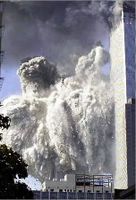
Associated Press
Thursday, February 10, 2005; 10:13 AM
The Federal Aviation Administration received repeated warnings in the months prior to Sept. 11, 2001, about al Qaeda and its desire to attack airlines, according to a previously undisclosed report by the commission that investigated the terror attacks.
A previously undisclosed report by the 9/11 commission that investigated the suicide airliner attacks on the World Trade Center and the Pentagon detailed 52 such warnings given to FAA leaders from April to Sept. 10, 2001, about the radical Islamic terrorist group and its leader, Osama bin Laden.
The commission report, written last August, said five security warnings mentioned al Qaeda's training for hijackings and two reports concerned suicide operations not connected to aviation. However, none of the warnings pinpointed what would happen on Sept. 11.
Al Felzenberg, former spokesman for the 9/11 commission, which went out of business last summer, said the government had not completed a review of the 120-page report for declassification purposes until recently.
The unclassified version, first reported by The New York Times, was made available by the National Archives Thursday.
According to the report:
-- Aviation officials were "lulled into a false sense of security" and "intelligence that indicated a real and growing threat leading up to 9/ll did not stimulate significant increases in security procedures."
-- Of the FAA's 105 daily intelligence summaries between April 1, 2001 and Sept. 10, 2001, 52 mentioned Osama bin Laden, al Qaeda, or both, "mostly in regard to overseas threats."
-- It notes that the FAA did not expand the use of in-flight air marshals or tighten airport screening for weapons. It said FAA officials were more concerned with reducing airline congestion, lessening delays and easing air carriers' financial problems than thwarting a terrorist attack.
-- A proposed rule to improve passenger screening and other security measures ordered by Congress in 1996 had been held up by the Office of Management and Budget and was still not in effect when the attacks occurred, according to the FAA.
-- Information in this report was available to members of the 9/11 commission when they issued their public report last summer. That report itself contained criticisms of FAA operations.
The Season is Over: An E-mail exchange...

How many things do you truly miss? For me - some of them are women & cities & other countries and maybe Saturday Night Live in its glory early 70's years - Leafs too then - and Ali too then - well maybe a whole lot of stuff between 1970 and 1978 - so maybe I'm just missing my youth....
Who can say where we´re going...

Lost in Translation
I could feel at the time
There was no way of knowing
Fallen leaves in the night
Who can say where they´re blowing
As free as the wind
And hopefully learning
Why the sea on the tide
Has no way of turning
More than this - there is nothing
More than this - tell me one thing
More than this - there is nothing
It was fun for a while
There was no way of knowing
Like dream in the night
Who can say where we´re going
No care in the world
Maybe I´m learning
Why the sea on the tide
Has no way of turning
More than this - there is nothing
More than this - tell me one thing
More than this - there is nothing
Roxy Music
Wednesday, February 09, 2005
A journey that is peaceful...

I leave a lot of space just to feel. I don't know what complex means, but I really resist feeling like I can't reach the everyday person. That's really important to me, because that's what moves me. I hope that someone can just listen to my music and say, that's a nice beat. Or, if that want to take it further, that's good, but it just physically feels good.
When you say it's physical, that's interesting, because your music has a physical feeling in that it hits your whole person and surrounds you totally.
I don't really know what's happening in that way, but I hope that people feel that when they're at my show there's a space for them. That's what I like, and I try to do that. I want to transport you somewhere. Maybe that's the role of the arts, to offer a place to go, or a journey that is peaceful. Someone was talking to me yesterday about a place in Shibuya station in Tokyo. She said there are thousands of people moving through the station, and you turn a corner and suddenly there's a tearoom. You can't imagine you'd relax in Shibuya station, but they provide a calm space.
So you feel your songs are like?
a tearoom in Shibuya station. (laughs)
www.sheeba.ca
Max Schmeling
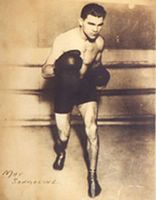
Max Schmeling 1905 - 2005
During the '36 Olympics Max Schmeling exacted a promise from Hitler that all U.S. athletes would be protected. On several occasions Hitler tried to cajole the respected boxer into joining the Nazi Party, but Schmeling vigorously refused ever to join the Nazi party or to publicize the Nazi propaganda line. Over Goebbels' personal protest, he refused to stop associating with German Jews or to fire his American Jewish manager, Joe Jacobs.
In an article, published in History Today, two professors at the University of Rhode Island, Robert Wiesbord and Norbert Heterich, tell how Schmeling agreed to hide the two teenage sons of a Jewish friend of his, David Lewin, during the awful time of Krystallnacht, November 1938 when Nazi pogroms against the Jews reached new heights.
He kept the Lewin boys, Henry and Werner, in his apartment at the Excelsior Hotel in Berlin, leaving word at the desk that he was ill and no one was to visit him. Later, when the rage of hate died down a little bit, did Schmeling help them flee the country to safety. They escaped and came to the United States where one of them, Henri Lewin, became a prominent hotel owner. This episode remained under shrouds until 1989, when Henry Lewin invited Schmeling to Las Vegas to thank him for saving his life. To this day, Henri Lewin believes that he and his brother owe their lives to Max Schmeling and he is convinced that Schmeling himself could have died for his humanitarian gesture.
Hitler never forgave Schmeling for refusing to join the Nazi party, so he had him drafted into the Paratroops and sent him on suicide missions.
www.auschwitz.dk/schmeling.htm
Tuesday, February 08, 2005
Priorities Part Three...
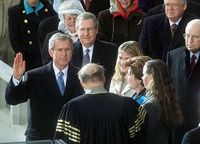
The cost of the event has also provoked controversy.
Washington's mayor, Anthony Williams, has complained that the city will have to spend $17.3m to help pay for security. The federal government normally reimburses the city for such costs, but this year it has told Mr Williams to take most of the money from Washington's homeland security budget, draining its defences for the rest of the year.
Democrats have criticised the $40m celebrations as a tasteless display of excess, saying tradition dictates that wartime inaugurations are restrained affairs. The Republicans' response has been that the whole event is dedicated to US soldiers serving abroad.
That sponsorship has, in its turn, attracted scrutiny. Election rules do not allow firms to make direct campaign donations to candidates, and they place strict limits on individual contributions.
These restrictions do not apply to inaugurations, and a host of corporations have lined up to demonstrate their support. They are permitted to give up to $250,000.
Some companies, like the Marriott hotel chain, have got around the nominal $250,000 limit by arranging donations from subsidiary firms. Other big givers include Ford, Exxon Mobil, and the defence contractor Northrop Grumman.
Packages offered to guests include a $1m deal, for which they get four nights in a hotel a stone's throw from the White House, return travel from any city in the US, a chauffeur and a butler on 24-hour call for the duration, his-and-her diamond watches and designer outfits, spa treatment and monogrammed bathrobes
An exclusive lunch with Mr Bush and the vice president, Dick Cheney, and two tables for 19 friends at an eve-of inauguration banquet is not cheap either, at $250,000
Julian Borger, The Guardian
Priorities Part Two...
Bush Tax Cuts
Agriculture: Cut farm subsidy by $587 million and impose 5% reduction in crop and dairy payments.
Medicaid: Cut $45 billion from the health program for the poor.
Amtrak: Eliminate the $1.2 billion a year subsidy for the state-run passenger rail service.
Environmental Protection Agency: Reduce spending by 1% to $56 billion.
Education: Cut spending by 2% to $23.4 billion.
Energy: Cut spending by 2% to $23.5 billion.
Housing and Urban Development: Cut spending by 11.5% to $28.5 billion.
Health and Human Service: Cut spending by 1.2% to $67.2 billion.
Barrie McKenna, Globe and Mail
Priorities Part One...
HUMAN COSTS
U.S. MILITARY DEATHS: Between the start of war on March 19, 2003 and June 16, 2004, 952 coalition forces were killed, including 836 U.S. military. Of the total, 693 were killed after President Bush declared the end of combat operations on May 1, 2003. Over 5,134 U.S. troops have been wounded since the war began, including 4,593 since May 1, 2003.
CONTRACTOR DEATHS: Estimates range from 50 to 90 civilian contractors, missionaries, and civilian worker deaths. Of these, 36 were identified as Americans.
JOURNALIST DEATHS: Thirty international media workers have been killed in Iraq, including 21 since President Bush declared the end of combat operations. Eight of the dead worked for U.S. companies.
ECONOMIC COSTS
THE BILL SO FAR: Congress has already approved of $126.1 billion for Iraq and an additional $25 billion is heading towards Congressional approval, for a total of $151.1 billion through this year. Congressional leaders have promised an additional supplemental appropriation after the election.
LONG-TERM IMPACT ON U.S. ECONOMY: Economist Doug Henwood has estimated that
the war bill will add up to an average of at least $3,415 for every U.S. household. Another economist, James Galbraith of the University of Texas, predicts that while war spending may boost the economy initially, over the long term it is likely to bring a decade of economic troubles, including an expanded trade deficit and high inflation.
OIL PRICES: Gas prices topped $2 a gallon in May 2004, a development that most analysts attribute at least in part to the deteriorating situation in Iraq. According to a mid-May CBS survey, 85 percent of Americans said they had been affected measurably by higher gas prices. According to one estimate, if crude oil prices stay around $40 a barrel for a year, U.S. gross domestic product will decline by more than $50 billion.
ECONOMIC IMPACT ON MILITARY FAMILIES:
Since the beginning of the wars in Iraq and Afghanistan, 364,000 reserve troops and National Guard soldiers have been called for military service, serving tours of duty that often last 20 months. Studies show that between 30 and 40 percent of reservists and National Guard members earn a lower salary when they leave civilian employment for military deployment. Army Emergency Relief has reported that requests from military families for food stamps and subsidized meals
increased "several hundred percent" between 2002 and 2003.
http://www.ips-dc.org/iraq/costsofwar/
Monday, February 07, 2005
The Wink of a Million Eyes...
"I'm hollowed out with loneliness," the women cries.
The water moves with measured heaves. Rain begins to fall suddenly; the wink of a million eyes on the water.
Ken Kesey
Practical thinking...
"You've got to find a way to get her to rip your clothes off and then put them away!"
Man Providing Advice to a Man with an Obsessively Neat Wife
On bizarrely beautiful images...

http://archive.ncsa.uiuc.edu
Many people are immediately drawn to the bizarrely beautiful images known as fractals. Extending beyond the typical perception of mathematics as a body of sterile formulas, fractal geometry mixes art with mathematics to demonstrate that equations are more than just a collection of numbers. With fractal geometry we can visually model much of what we witness in nature, the most recognized being coastlines and mountains. Fractals are used to model soil erosion and to analyze seismic patterns as well. But beyond potential applications for describing complex natural patterns, with their visual beauty fractals can help alter students' beliefs that mathematics is dry and inaccessible and may help to motivate mathematical discovery in the classroom.
National Center for Supercomputing Applications, Education Group
The future of the city will depend on the quality of the public realm.

Calatrava, Tenerife Opera House
People should be aware that in post-amalgamation Toronto, we are regressing seriously on the urban design of our streets. All the innovations that were made in the seventies and eighties for pedestrian-friendly streets with sophisticated engineering are being swept away. The priority has been to moving traffic faster. An extreme contrast is the mayor of Boston who has made one of his platforms 'great streets throughout the city.' Instead of urban design being a little sideshow about street ornamentation, it is central to the design of streets.
Ken Greenberg
The future of the city will depend on the quality of the public realm. That's the bottom line. Where in other cities there are healthy trees on the street and the sidewalks are great. I saw it at the University of Toronto, and the need to establish endowment funds for its public realm. The city needs to be able to do that, and do it in a way that's really bold. A new vision has to be set.
Bruce Kuwabara
Sunday, February 06, 2005
JAH sun is on the rise once again...

So much trouble in the world now (repeat)
Bless my eyes this morning
JAH sun is on the rise once again
The way earthly things are going
Anything can happen
You see men sailing on their ego trips
Blast off on their spaceships
Million miles from reality
No care for you, no care for me
So much trouble in the world now (repeat)
All you've got to do is give a little
Give a little, give a little
One more time ye-a-h! ye-ah!
So you think you have found the solution
But it's just another illusion
So before you check out your tide
Don't leave another cornerstone standing there behind
We have got to face the day, ooh we come what may
We the street people talking, we the people struggling
Now they are sitting on a time bomb
Now I know the time has come
What goes up must come down
Goes around comes around
So much trouble in the world
So much trouble in the world
So much trouble in the world
There is so much trouble, there is so much trouble
There is so much trouble
There is so much trouble in the world
There is so much trouble in the world
Saturday, February 05, 2005
"You know Bob..."
Two men dressed in pilot's uniforms walk up the aisle of the airplane. Both are wearing dark glasses, one is using a guide dog, and the other is tapping his way along the aisle with a cane.
Nervous laughter spreads through the cabin, but the men enter the cockpit, the door closes, and the engines start up. The passengers begin glancing nervously around, searching for some sign that this is just a little practical joke. None is forthcoming.
The plane moves faster and faster down the runway, and the people sitting in the window seats realize they're headed straight for the water at the edge of the airport territory. As it begins to look as though the plane will plough into the water, panicked screams fill the cabin. At that moment, the plane lifts smoothly into the air. The passengers relax and laugh a little sheepishly, and soon all retreat into their magazines, secure in the knowledge that the plane is in good hands.
In the cockpit, one of the blind pilots turns to the other and says, "You know, Bob, one of these days, they're gonna scream too late and we're all gonna die."
Friday, February 04, 2005
Maybe Anything...
He hadn’t looked at the letter from Rachel until that evening. It was a Petition for Divorce.
Petition sounded too much like penitent to Hannah. He wasn’t sure what either meant exactly but he thought penitent had something to do with sin, or regret, or maybe both.
He sat down in the window with the view of the lake and read. “The respondent has treated his spouse with mental cruelty of a seriousness that makes it impossible for the two to continue to live together.” Jesus Christ. “…a persistent and wilful withdrawal of companionship…” Was this really Hannah? Was this Rachel and Joe? He’d been a cop long enough to know that a lawyer could make anything sound bad, and the truly great lawyers could make even the bad sound good but this was not anyone or anything that Hannah could recognize.
The fact was Hannah always thought it was Rachel that had withdrawn first, lost like a hand slipping under water. She seemed always so angry – angry at the newspaper in the morning, at things she heard at the school from one of the mothers, angry at Esther and in the end angry with Hannah. But none of this anger seemed tied to anything that Rachel could talk about directly. In the end the anger, the slow burn rage, turned slowly inward until Rachel was depressed, dark, until everything and everybody in their small family was touched by the long shadow of withdrawal and denial. Hannah took to spending long nights in their small garden with a cigar and too many scotches.
“Is this your Buddhist thing?” Rachel said one night as dark fell.
“Your point is?”
“Are you meditating Joe, or sulking or pissed off or what? What exactly?” Rachel shifted a chair out of the light from the back door and sat in the dark, her face leaning in toward Hannah.
“Not anything Rachel. I’m sitting. I’m thinking.” Hannah paused. “I’m thinking what the fuck is going on and how the fuck did I get here and what the fuck it will take for this, for you, for us to move on”.
“That sounds like sulking to me”. Hannah closed his eyes and took a long drag on the cigar then let the smoke drift slowly up while he watched it, focussing on nothing, nothing at all.
“Whatever.”
“I think you hate what you do Joe. I think you see the world as a dirty place, an ugly place filled with bad people and that makes you angry. That makes you hate your job, and probably the world, and probably yourself and maybe me and maybe being here…”
“You seem to have it all worked out Rach.”
“You weren’t like this before. You’re not like this when you’re painting or most of the time with Esther or…”
“I don’t know about before. I can’t remember before. Anyway, it’s not about before. Nothing is.”
“What’s wrong Joe? We don’t seem to agree about anything. You’re more and more angry, I can see that and that makes me angry – no, not angry – scared. I’m scared to be around you sometimes”. Hannah stood up, walking towards the back of the garden. His drink in his hand, swung back and forth slowly at his side. He dropped the unfinished cigar, stepped on it and kicked it, still smoking into the darkness.
“Rach – I’m tired. I’m going in. I don’t think this is getting us anywhere. I think…” Hannah tuned back toward Rachel who sat with her back to him. “Scared? You’re scared of me?”
“Maybe…that didn’t come out right. Maybe it’s…”
Hannah spoke almost at a whisper, suddenly very tired now.
“Maybe it’s me. Maybe it’s the job. Maybe it’s I hate everything. Maybe tomorrow it will be something new, something bad…maybe anything.”
What do I gotta do? Crawl on my hands and knees?

25 Years - Buy the DVD
JAKE:
What the fuck they want? I took the dive. They want me to fall down too? I don't fall down for nobody. I never went down in my life. Joey, what do I gotta do? Crawl on my hands and knees? I made an asshole of myself in the fuckin' Garden! All the newspaper writers make fun of me. I'm the bum of the year. All I want is a shot. Just a fuckin' shot. What do I gotta do? I'll do anything.
JOEY:
Except fall down like a normal person.
JAKE:
Yeah, except fall down. That's right.
Paul Schrader & Mardik Martin
Thursday, February 03, 2005
There is not much more to life than that story...

As my book Portraits was being completed, there were certain artists whose work had affected me, whom I had not photographed, and one of them was Jean Renoir. Renoir lived in Beverly Hills and I went to him. His home looked like everything I’d always thought a home should be. It looked like south of France. It didn’t look like Beverly Hills. There were flowers in and out of the rooms and sunshine coming through the windows. And a long table in the middle of the room. A long table at the center of a house has always had great meaning for me. When I arrived, I was shown to his bedroom. He was naked, being helped to dress, completely unembarassed by my presence. He was old and quite sick at the time and he walked with difficulty, with a walker. There was something so moving about his face and about his life and his work and what he stood for. He was one of the last people I felt in awe of. When the sitting was over, (in those days I worked with incredible intensity, I mean my heart would pound out of control while I photographed), Renoir said, "Won’t you join us?"
So I sat at the table and some friends arrived with vodka and a Sunday cake and Renoir sat down. Behind him was a portrait of him as a child painted by his father and the potteries he had made as a child guided by his father.
A young Czechoslovakian director who was there visiting started to talk with Renoir about Film. What happened to me used to happen to me very often — I froze, I couldn’t speak or think. I felt inadequate. I thought — what can I say or contribute to anything that happens at this table. Well, actually nothing so grand was happening. I considered myself very good at disguising my feelings and I knew there was no necessity for me to speak. I could legitimately be a quiet person. But I was paralyzed inside. Smiling, trying to appear comfortable, thinking — what right do I have to be at this table? I came to do my photograph, I should leave. I am not a friend of the Renoirs, this is Sunday.
Renoir stood to go to the bathroom and I used that occasion to say goodbye to everyone. As I walked to the front door, he came our of his bedroom with his walker which sort of blocked my way. And we were stuck there, in the narrow hall, in this confrontation. I extended my hand and said, "Monsiour Renoir, thank you very much for allowing me to photograph you." And he looked into my eyes and spoke, and I’ll never forget his words, "It is not what is said that matters, it’s the feelings that cross the table."
I froze my face. I walked to the car and wept. Imagine a man in his eighties, sick as he was, knowing what was happening to me at the table, and to care, and to say it. Well, that’s my kind of standard for human behavior. To be able to be that present in each moment. The quality of paying attention that he had, and then the compassion. I think there is not much more to life than that story: to be that age, surrounded by your father’s works of art, to have created your own, to live in a house with sunshine falling through the windows, and a wife, and a jar of vodka with spirals of lemon rind in it, and friends and your own son who has become a teacher and his children sitting with the grownups, on Sunday — and to still pay that kind of attention to a stranger.
Richard Avedon
Life...Okay So Far...
Life without industry is guilt.
Industry without art is brutality.
John Ruskin
We probably could have saved ourselves but we were too damn lazy and too damn cheap to try very hard.
Kurt Vonnegut
Man to someone falling past his window in the Empire State Building: How's it going?
Man falling past window: Okay so far!
Wednesday, February 02, 2005
A Frill on the Edge of Life...
"People think of the arts as a kind of frill on the edge of life -- that there's real life, the gritty business of earning a living, surviving wars, mating and reproducing, then you get this frill on the edge, which is to go to the opera, go to an art gallery," he says. "I think of all the arts as the quest that is in all of us to find what is most meaningful, what is most beautiful, what is most satisfying.
"In societies that are afflicted by war and so on, far from everybody saying, 'We don't care about the arts, we are too busy surviving,' it's the exact opposite. The arts become supremely significant to them," he notes.
"We don't take art seriously enough. It's got itself all muddled up with money. Paintings are routinely valued by the number of millions of dollars they'll sell for in an auction. Poets or writers are admired for their biography more than for their work."
William Nicholson
There is a reason, my friends, and the reason is...

Oh my god Mrs Robinson...
EXT. AMPHITHEATRE - SHOT OF PODIUM - DAY BEN
- and today it is right that we should ask ourselves the one most important question: What is the purpose of these years, the purpose for all this demanding work, the purpose for the sacrifices made those who love us? Were there NOT a purpose, then all of these past years of struggle, of fierce competition and of uncom- promising ambition would be mean- ingless. But, of course, there is a purpose and I must tell it to you. I ask you to remember this purpose always and I pledge that I shall endeavor to carry it with me forever.
SHOT - AMPHITHEATRE AUDIENCE - DAY staring at him impassively.
INTERCUT BETWEEN SHOTS of impassive students, seated, watching; of Ben standing alone on the huge amphitheatre stage; of CLOSEUPS of Ben speaking; of loudspeakers; of wind-blown papers on the podium.
EXT. PODIUM OF AMPHITHEATRE - DAY BEN (continuing)
The purpose, my fellow graduates - the purpose is - He stops, trying to think of the word.
CLOSEUP - BEN He begins to sweat.
SHOT - AMPHITHEATRE AUDIENCE watching.
SHOT - PODIUM of AMPHITHEATRE Ben's hands searching through the pages of his speech. The pages begin to blow away in the wind.
SHOT - AMPHITHEATRE AUDIENCE - DAY staring.
SHOT - PODIUM OF AMPHITHEATRE - DAY BEN
- there is a reason, my friends, and the reason is -
CLOSEUP - BEN He is in a panic. He looks up from his papers at the audience.
SHOT - AMPHITHEATRE - DAY The audience is gone.
SHOT - PODIUM OF AMPHITHEATRE - DAY BEN - the reason is - the purpose is -
SOUND of the WIND becoming the ROAR of an AIRCRAFT coming at us through the air.
SHOT - AMPHITHEATRE - DAY Huge and empty. SOUND of AIRCRAFT.
Buck Henry, The Graduate
Tuesday, February 01, 2005
Sitting on a Debt Time Bomb...

Canadian households have put themselves seven per cent deeper into debt than a year ago and are acutely vulnerable to any economic turmoil, a CIBC World Markets report warned Thursday.
An apocalyptic credit-market collapse is unlikely but "a complacent approach toward the rapid pace at which Canadians borrow is similarly misleading and dangerous," according to the study by economist Benjamin Tal.
Debt is increasing faster than the economy's fundamentals can support, he wrote in a study titled Are We Sitting on a Debt Time Bomb?
"I'm talking about people who borrow to support a lifestyle they cannot otherwise afford," Tal said in an interview.
"The sensitivity of households to higher interest rates and to other economic shocks suggests that the next recession will be more severe because of that."
His report says Canadian households owe 20 per cent more than at the start of the decade while average disposable incomes have risen at an annual rate of less than two per cent after inflation, amid an "almost chronic inability of the Canadian economy to generate high-paying jobs."
Gary Norris
One Afternoon in North Beach...
"Have you ever been to a whorehouse? I mean a friend of mine went and he said he had never felt so dirty. I've never gone of course...Well I've gone to a massage place, you know, and it's business, just all business. You have to figure you sometimes get just one moment, one moment of ecstasy and it's gone. Grab it! Yeah right!"
"...Cooking is the closest thing to instant gratification there is. You chop it. You cook it. You eat it! Fuckin' great. I love it! I mean my whole life I do things that make me feel good so I learned to cook because I like to fuckin' eat!.."
"...Well, I have no confidence in this area so I avoid it. But now she's gone, there's a ritual that I have to face..."
"All of my friends are splitting. You are just like, one of four!"
"But where am I on the pain scale!"
"...You know what the kiss of death for a fuckin' relationship is? 'You are the perfect couple!' You hear that, you take it and run because that is bullshit my friend!.."
"...I don't give a shit. I miss her. There are similarities in our very souls and I don't want to lose that bond. She's off on one of her little pipedreams and, right off the bat, she's gone. She won't come back..."
"...That may happen. That may happen...."
"There might be some great physical distance between us, you know, but at least I know where she is..."
"...One day you'll pick up the paper and see her name..."
"...Hey I put nine years into this! So, a week ago, she's taking a shower and she's taken off all of her jewelry...'Oh, I bruised my finger and I can't wear my ring'...You know, she said...'I can't wear this anymore!'..You know what I did with my ring? I sold it , cause I got kicked in the balls!"
"...You know, since you've had all of these problems, I've been thinking 'Shit! It's tough out there!"
Getting Rid of the Blood on their Hands...
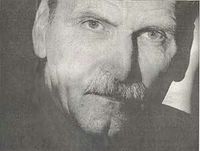
Romeo Dallaire
How do you feel now when you hear U.S. senior officials -- Clinton, Albright, others -- talk about Rwanda? Of course Clinton went and apologized--
He didn't apologize.
Well, it was couched as an apology.
No, no. He went to reinforce the blackmail on the Rwandans. … When he was there in `98, he said, "Oh, I didn't know. We didn't realize." I've got all those quotes and stuff, which are outright lies. They knew, it was there as information, and it is evident that that information was either at his level or stopped within the structures. But the Americans knew what was going on inside there, and [it's awful] to go and excuse yourself -- the Belgians did the same thing -- in front of these people. The Americans scuttled any initiative to bring about a force to be able to save hundreds of thousands. How can they look at this guy and accept an apology?
But worse than that is that the Rwandans need American money. They need Belgian money to reconstitute themselves. What option do they have regarding Clinton coming in there and trying to excuse himself? Throw him out? No. Embarrass him? They gave him a bit of a hard time, but that was insignificant to what was deserved. These great leaders who go to these countries and ask for excuses, that's sort of like trying to get rid of the blood on their hands. Really what they're doing is imposing that on those people, blackmailing them to accept these apologies, so that it satisfies the people back home that we brought closure. "I went there and in humble statements I demonstrated that we had failed and that we are sorry about it." Bullshit. I have no time for any such actions. There is no respect of the people. I mean it's crass to actually be able to go there and say that. …
http://www.pbs.org/wgbh/pages/frontline/shows/ghosts/interviews/dallaire.html










